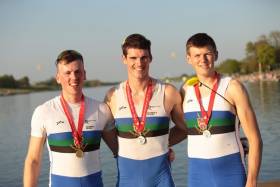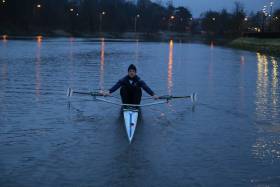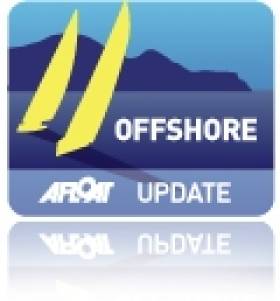Displaying items by tag: Philip Doyle
Queen's in the Medals at BUCS Rowing Regatta
#Rowing: Queen’s University, Belfast, launched a very successful raid on the medals available on the first two days of the BUCS Regatta in Nottingham.
Queen’s had a very successful Saturday. They won the Beginners’ coxed four, and their talented group of scullers also shone. Philip Doyle took silver in the Championship single, while Sam McKeown took fourth. In the intermediate single, Queen’s took gold and silver, through Tiernan Oliver and Nathan Hull.
This foursome were again on song on Sunday. McKeown and Doyle took silver in the Championship double, and Hull and Oliver matched them. Fiona Bell also made the podium in the women’s Championship single scull, taking bronze.
BUCS (British University) Regatta, Nottingham (Selected Results; Irish interest)
Saturday
Men, Four – Beginners’, coxed: 1 Queen’s 7:10.49.
Sculling, Single – Championship: 1 Edinburgh (J Armstrong) 7:20.99, 2 Queen’s (P Doyle) 7:22.01; 4 Queen’s (S McKeown) 7:27.73. Intermediate: 1 Queen’s (T Oliver) 7:37.48, 2 Queen’s (N Hull) 7:37.66.
Sunday
Men, Sculling, Double – Championship: 1 Reading 6:40.76, 2 Queen’s 6:43.56. Inter: 1 Reading 6:55.04, 2 Queen’s 7:00.91.
Women
Sculling, Single – Championship: 1 Edinburgh 8:09.20; 3 Queen’s 8:26.50.
Doyle is Afloat Rower of the Month for February
#Rower of the Month: Philip Doyle of Queen’s University is the Afloat Rower of the Month for February. The big medical student was the fastest single sculler at the Lagan Scullers’ Head of the River. He covered the course in under 12 minutes and had just over 17 seconds to spare over Portadown’s Sam McKeown.
Rower of the Month awards: The judging panel is made up of Liam Gorman, rowing correspondent of The Irish Times, and David O'Brien, editor of Afloat magazine. Monthly awards for achievements during the year will appear on afloat.ie and the overall national award will be presented to the person or crew who, in the judges' opinion, achieved the most notable results in, or made the most significant contribution to rowing during 2016. Keep a monthly eye on progress and watch our 2016 champions list grow.
Legally Brunette to Return for Middle Sea Fixture
Whilst the major noise surrounding the 2010 Rolex Middle Sea Race will resonate around Esimit Europa 2's anticipated assault on the course record, there is much more to the race than the maxi component. Ireland is to have at least one entry in the form of repeat Dun Laoghaire contender Legally Brunette.
Cathal Drohan and Paul Egan are the owners of the Royal St George Yacht Club entry and the X41 will be skippered by Cathal Drohan for the race. The crew for the race are scheduled to be John Hall, Philip Doyle, Matt Patterson, Philip Allen, Susan McGrath, Susan Delany, Anna Egan, Niall O hEalaithe.
The Maltese participation is a crucial element in the success and popularity of the race. After watching foreign yachts secure overall victory in seven out of the eight races so far sponsored by Rolex, there is a feeling amongst the locals that it is time to redress the balance. When the 606-nautical mile race starts on 23 October, there will be a veritable posse of Maltese yachts chasing the seemingly elusive crown.
One of those yachts is even named Elusive II; the weapon of choice for Arthur Podesta, a thirty-time veteran of the race, which is now approaching its 31st edition. Podesta's record is enviable. No other major 600-nm offshore course – Rolex Fastnet, Rolex Sydney-Hobart or Newport-Bermuda – can boast a participant that has competed in every race since its inception. Immensely proud of his continuing achievement, which includes being a three-time winner as crew, Podesta takes nothing for granted and is happy enough to make the start-line each year. Do not confuse that with lack of ambition. Podesta and his crew, which usually has its backbone formed by his three children - Maya, Aaron and Christoph - push as hard as anyone for the win. In 2008, they finished third overall, a mere forty-minutes off the corrected time pace.
Another family affair involves the last Maltese winners and a family name synonymous with the colourful history of Malta's flagship sailing event. In 2002, John Ripard Jr and Andrew Calascione sailed Market Wizard to first overall. This year they are back again, with a neat twist as Ripard explains, "my brother-in-law Andrew Calascione and I will co-skipper Andrew's very recent acquisition Jaru, which is a J-133. We'll have with us a crew comprised almost entirely of direct family, being: my two sons, Sebastian and Thomas; Andrew's two sons, Daniel and Marc; plus, my sister Rachel's son, Luke Scicluna, and, my sister Erika's son, Sam Pizzuto. My father, John Ripard Sr [winner of the inaugural race in 1968], will have six grandchildren on the same boat!" The remaining three crew are Benji Borg, Sebastian Ripard's 49er Olympic campaign partner, John Santy from the UK and an Australian, Jordi Smith.
Another local with an eye on the main prize is Jonas Diamantino embarking on his tenth race and, once again, with Comanche Raider II Gasan Mamo. Diamantino exudes optimism ahead of each race; firmly believing he has the crew and the boat should the conditions favour them. This should not be seen as making excuses ahead of game-time for a poor finish. However good the handicap system, there is always an element of chance that the weather conditions will suit one end of the fleet or the other. That is the accepted nature of long-distance yacht racing. In recent years the big boats have held the upper hand. 2008 provides the sole glimmer of hope since 2002 for the smaller yachts, when the First 40.7, Spirit of Ad Hoc, took the crown.
Also in the same camp as Diamantino is Jonathon Gambin, with Ton Ton Surfside. Gambin sees nothing wrong in aiming high; seeking to test himself and his crew each time they cross the start line. Sandro Musu and Aziza have also come close to the Holy Grail, finishing fifth overall in 2004. Musu is as excited as ever heading into his seventh straight race.
Kevin Dingli and Fekruna will be satisfied to make the start line after last year losing his rig just before his debut race as skipper. Caught by a truly destructive waterspout during the inshore warm-up race, Dingli thought his race was over until his friend Peter Vincenti offered up his yacht, Manana. Edward Gatt Floridia, who has tasted the glory of being onboard the first Maltese yacht to finish, is skippering Otra Vez Fexco, one of the smallest boats in the fleet, for the second time. Another member of the Ripard clan will be on Lee Satariano's J-122 Artie. Christian Ripard is a two-race winning skipper, once in 1996 and then again in 2001; coincidently, both times with J-Boats – maybe a good omen. Satariano, himself, came close to the ultimate prize in 2006, almost scooping the trophy from under the nose of the German maxi Morning Glory. Alfred Manduca and Allegra round out the Maltese roster.
Sonke Stein may be German, but he is as good as a local in the eyes of many. He and his exuberant crew, which includes seven Maltese, have been a feature of the race for a number of years. Stein loves the it, most of the time, and this year is entering a new boat, coincidently a J-133 just like Ripard and Calascione, "she's named Juno and though she is registered in Hamburg, she is based in Malta. We have raced the boat a couple of times and are very happy with her performance. The crew is still a majority of Maltese, comprising my old team mixed with some others from the J-125 Strait Dealer [winning boat in 2001] crew. With experience from my earlier J-105 Oh Jee and the experience from Strait Dealer added to it we are looking forward to the race."
Whatever the weather and whatever the eventual results, the Maltese crews may expect a crescendo of noise to match any surrounding their more celebrated foreign-counterparts. The crowds lining the Valletta bastions at the start and the Royal Malta Yacht Club deck at the finish will make sure of that.
The Rolex Middle Sea Race commences on Saturday, 23 October 2010. Entries close on 15 October. The final prize giving is on Saturday, 30 October. George David's Rambler (USA) established the current Course Record of 47 hours 55 minutes and 3 seconds in 2007.
































































